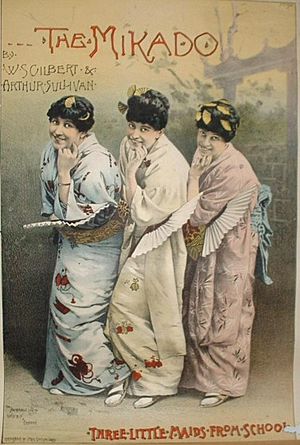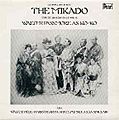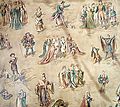The Mikado facts for kids
The Mikado, or The Town of Titipu is a famous and funny musical play. It's a type of light opera called an operetta. The story and words were written by W. S. Gilbert, and the music was created by Arthur Sullivan. This show first opened on March 14, 1885, in London, England, at the Savoy Theatre. The D'Oyly Carte Opera Company performed it.
The Mikado is the ninth of fourteen operettas made by Gilbert and Sullivan. It was very popular and ran for 672 shows when it first opened. This was the longest run for any of their operettas! When the show was being created, London was very interested in Japanese culture. There were Japanese tea shops, kimonos, and fans everywhere. Gilbert said he got the idea for The Mikado when a Japanese sword fell from a wall in his study.
Contents
Main Characters
These are the main people you'll meet in The Mikado:
- The Mikado of Japan (a deep male singing voice)
- Nanki-Poo (a high male singing voice) – He is the Mikado's son, but he's pretending to be a traveling musician. He loves Yum-Yum.
- Ko-Ko (a funny male singing voice) – He is the chief executioner of Titipu.
- Pooh-Bah (a male singing voice) – He holds many important jobs in the town.
- Pish-Tush (a male singing voice) – A noble lord.
- Go-To (a deep male singing voice) – Another noble lord.
- Yum-Yum (a high female singing voice) – She is looked after by Ko-Ko and is supposed to marry him, but she loves Nanki-Poo.
- Pitti-Sing (a medium female singing voice) – Also looked after by Ko-Ko.
- Peep-Bo (a high or medium female singing voice) – Another of Ko-Ko's wards.
- Katisha (a low female singing voice) – An older lady who wants to marry Nanki-Poo.
- There is also a group of school-girls, nobles, guards, and workers who sing in the show.
The Story of the Play
The story of The Mikado is full of funny mix-ups and happy endings. Nanki-Poo is the son of the Mikado, the ruler of Japan. He has run away and is pretending to be a traveling musician. He does this so he can be close to Yum-Yum, a village girl he loves very much.
However, their love story is tricky! An older woman named Katisha believes she is going to marry Nanki-Poo. Also, Yum-Yum is supposed to marry Ko-Ko, the town's Lord High Executioner.
In the end, after many funny situations and misunderstandings, Nanki-Poo and Yum-Yum finally get to be together. Katisha also finds love with Ko-Ko, the executioner. Everyone ends up happy!
Famous Songs
The Mikado is known for its many catchy and memorable songs. The show starts with an Overture, which is a mix of tunes from the operetta.
Act I Songs
- "If you want to know who we are" (Sung by the Men's Chorus)
- "A Wand'ring Minstrel I" (Sung by Nanki-Poo) – This is a very famous song where Nanki-Poo introduces himself.
- "Our Great Mikado, virtuous man" (Sung by Pish-Tush and Men)
- "As some day it may happen" ("I've Got a Little List") (Sung by Ko-Ko and Men) – In this funny song, Ko-Ko talks about people he would like to "execute" (but in a silly way!).
- "Three little maids from school are we" (Sung by Yum-Yum, Peep-Bo, and Pitti-Sing) – This is one of the most famous songs from the show, sung by the three girls.
- "I am so proud" (Sung by Pooh-Bah, Ko-Ko and Pish-Tush)
Act II Songs
- "Braid the raven hair" (Sung by Pitti-Sing and Girls)
- "The sun whose rays are all ablaze" (Sung by Yum-Yum) – A beautiful song about beauty.
- "Brightly dawns our wedding day" (Sung by Yum-Yum, Pitti-Sing, Nanki-Poo and Pish-Tush)
- "Mi-ya Sa-ma" (Sung by the Mikado, Katisha, and Chorus)
- "A more humane Mikado" (Sung by the Mikado and Chorus) – The Mikado sings about his "kinder" ways of punishment.
- "The criminal cried as he dropped him down" (Sung by Ko-Ko, Pitti-Sing, Pooh-Bah, Chorus)
- "The flowers that bloom in the spring" (Sung by Nanki-Poo, Ko-Ko, Yum-Yum, Pitti-Sing, and Pooh-Bah) – Another very popular and cheerful song.
- "On a tree by a river" ("Willow, tit-willow") (Sung by Ko-Ko) – A sad but funny song.
- "There is beauty in the bellow of the blast" (Sung by Katisha and Ko-Ko)
Images for kids
-
Photo at the Japanese village taken by WS Gilbert
-
Political parody celebrating the 200th birthday of Albany, New York
-
From Gilbert's children's book The Story of the Mikado. Art by Alice B. Woodward.
-
Cover of The Story of the Mikado. Art by Alice B. Woodward.
See also
 In Spanish: El Mikado para niños
In Spanish: El Mikado para niños
 | Laphonza Butler |
 | Daisy Bates |
 | Elizabeth Piper Ensley |






















